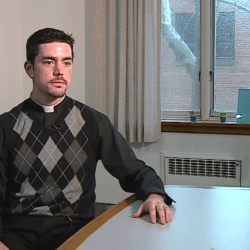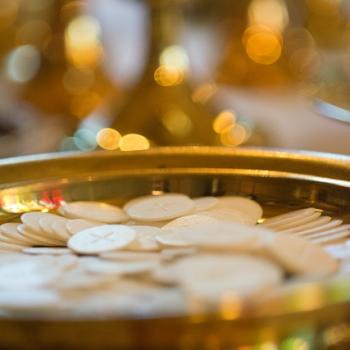That’s the title of a new book, and the subject of a symposium on the topic held recently in Washington featuring, among others, Archbishop Wilton Gregory of Atlanta.
Despite all the negative publicity of recent years, research shows U.S. Catholic priests are demonstrably among the happiest, most job-fulfilled and satisfied men in the country, theologian and psychologist Msgr. Stephen J. Rossetti said Oct. 5.
Key reasons seem to be their prayer life and the close relations they have established with God, fellow priests and laity in their parishes, he said.
Archbishop Wilton Gregory of Atlanta, the strong-minded former president of the U.S. Conference of Catholic Bishops who played a major role in 2001-02 in leading the bishops to confront the crisis of clergy sexual abuse of minors, strongly affirmed many of Rossetti’s findings from his own experience.
Rossetti and Gregory were the two main speakers at a symposium Oct. 5 at The Catholic University of America in Washington. The symposium — titled “Why Priests Are Happy” — marked publication of Rossetti’s research book by the same name. The more than 100 participants received free copies of his book, published by Ave Maria Press at Notre Dame.
The title at first glance might seem unlikely from a book by Rossetti, who knows first-hand the problems that many unhappy, dysfunctional or troubled priests face. From 1996 to 2009, encompassing the peak years of the clergy sexual abuse crisis in this country, he was president and CEO of St. Luke Institute in Silver Spring, Md., the country’s leading Catholic facility treating priests and religious who face alcohol, drug or sexual addictions or other severe problems that make them incapable of effective ministry.
Gregory knows the issue equally well in another way.
First, as a young auxiliary bishop in Chicago whose main background was a doctorate in liturgy, in 1993 he was appointed to head the Diocese of Belleville, Ill., just as that diocese was in the midst of a local clergy sex abuse scandal as bad as that which emerged in Boston eight years later. The difference was that Gregory dealt with the issue effectively, removing abusive priests and it made few of the national headlines prompted eight years later by the Boston Globe’s reportage on Boston Cardinal Bernard F. Law’s inept handling of the same kind of situation in Boston.
Second, as USCCB president 2001-04, Gregory played a major, almost certainly decisive, role in getting the entire body of U.S. bishops to adopt a legally binding charter for the protection of young people, subsequently approved by the Vatican, and many of its norms more recently adopted by the Holy See as norms for the universal church.
Whatever criticisms of inadequacy the U.S. charter and norms and subsequent implementation may face, it has introduced radical changes in the way both the U.S. and global church has addressed the sexual abuse of minors by priests over the past decade. Since then the Holy See has adopted universally more restrictive laws and more recently asked bishops’ conferences around the world to adopt measures that closely parallel the 2001 norms of the USCCB.
Check out the rest.
And to find some more happy clergy, read all about the new deacons ordained at the North American College in Rome yesterday. Congratulatiions!











